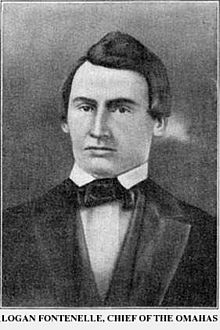Logan Fontenelle | |
|---|---|
 | |
| Preceded by | Big Elk |
| Personal details | |
| Born | May 6, 1825 Fort Atkinson |
| Died | July 16, 1855 (aged 30) Boone County, Nebraska |
| Residence | Nebraska Territory |
| Profession | interpreter |
Logan Fontenelle (May 6, 1825 – July 16, 1855), also known as Shon-ga-ska (White Horse), was a trader of Omaha and French ancestry, who served for years as an interpreter to the US Indian agent at the Bellevue Agency in Nebraska. He was especially important during the United States negotiations with Omaha leaders in 1853–1854 about ceding land to the United States prior to settlement on a reservation. His mother was a daughter of Big Elk, the principal chief, and his father was a respected French-American fur trader.
European Americans thought Fontenelle was a chief but, because of his white father, he was not considered part of the tribe. As the Omaha had a patrilineal system, only if he had been formally adopted by a man of the tribe could he have advanced to be a chief.[1] The Omaha considered him a half-breed and, because of his father, a "white man."[1] Fontenelle lived on the reservation and died young at the age of 30, killed with five Omaha on the tribal summer buffalo hunting trip when they were attacked by an enemy band of Sioux warriors.
Fontenelle acted as an interpreter in Omaha negotiations with the United States during 1853–1854 for land cessions, first in Nebraska, with 60 Omaha leaders and the US Indian agent Gatewood; they came to agreement in January 1854. Later that year, Fontenelle accompanied a delegation of seven gente chiefs of the Omaha who traveled overland to Washington, D.C., for further talks. Fontenelle was one of the signatories of the treaty, perhaps because he was the only Omaha speaker at the meeting who was literate in English. Forced to accept changes to the treaty during that trip, the Omaha chiefs agreed to cede 4,000,000 acres (16,000 km2) of their land to the United States. They believed that at least that they were securing US protection from the Sioux, but were to be disappointed. Within a couple of years, the Omaha removed to a reservation in northeast Nebraska in the Blackbird Hills, essentially present-day Thurston County.